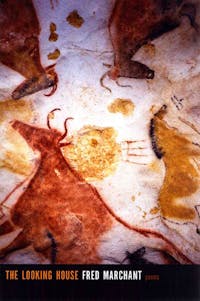The Looking House
Poems
 Download image
Download image
ISBN10: 1555975283
ISBN13: 9781555975289
Paperback
88 Pages
$15.00
CA$17.00
The Looking House lays out a map of human suffering, from wars within the psyche to wars that rage across the contemporary landscape. These intense, innovative lyrics stir and disturb. Marchant maps the shelters, the "precarious places" that give us refuge and "teach us everything." Such a place might be an open window at midnight in childhood, or the broken sill of a deserted hut on the coast of Donegal. In these poems a "looking house" can just as easily be a locked ward, a barracks, a movie theater at midday, or that room in Rome where Keats lay dying. These poems may show us a broken world, but they also offer glimpses of survival and renewal, of trust and re-connection.
Reviews
Praise for The Looking House
"When the news repeatedly presents images of war, readers often find themselves hoping for cease-fire, or at least someone to lead them through the conflicts. Poet Fred Marchant does the latter in his fourth book, The Looking House, in which he explores literal battles as well as those of the mind and spirit. Marchant has a deep understanding of both. During the Vietnam War, he was one of the first Marine officers to be honorably discharged as a conscientious objector. That experience colors his poetry as much as do his acute powers of empathy and observation. Even during the darkest moments, he has the ability to make readers feel compassion. Such is the case with his opening poem, 'House on Water, House in Air.' In these lines, starkly beautiful, Marchant balances overwhelming pain with profound tenderness . . . Marchant, who directs the Poetry Center at Suffolk University in Boston, continues to act—and write—as someone who doesn't just observe his surroundings, but subtly nudges readers to look below the surface. In 'A Place at the Table,' that means listening to people's opinions and honoring their presence, understanding that, 'Later in your life this moment will return to you as a mote/ of dust that floats in on the spars of sunlight./ It will search every room until it finds you.' Marchant often provides apertures—even when describing a book read in childhood—that allow him to connect with other people, despite their flaws or emotional wounds. Or he transforms a desperate situation into a 'looking house,' from which he can observe and record with palpable tenderness. Marchant's subject matter isn't easy. He doesn't flinch when describing an Iranian writer who has been tortured, a sister who is losing her memory, or the entrance to a prison, where people 'feel either you are in danger, or that you are the danger.' What makes these poems resonant, though, is that Marchant often sounds like a conscientious objector, not just a witness. He understands the difference between viewing and seeing things with unwavering clarity. At times, the reader can almost feel him standing at the edge of the room, watching with a knowing nod. This is especially true in the third section, where the intensity rises and rises—until Marchant suddenly releases that tension by closing with two gentle poems . . . He's a poet worth exploring."—Elizabeth Lund, The Christian Science Monitor
"Fred Marchant looks at the toughest imaginable experience (conscience at war) and the most tender (a sister aging). He finds them joined, or joins them. The Looking House is a major work by a poet whose ear is exquisitely tuned to contemporary anguish and whose voice rings with judgment, confidence, and truth."—James Carroll
"'What did/we have that any god would want?' asks Fred Marchant. In these lean, passionate poems, Marchant tests illusions, tests faiths, and makes things hard on himself. Whether visualizing childhood (in which the father holds the son's hand tightly 'as if it were the cash'), or moments in adult life like leaving the Marines as a conscientious objector, or a contemporary Iranian exiled writer who has been tortured, or the 7th century B.C.E. Greek poet Archilochus—Marchant brings clarity, compassion and inventiveness to his task. These are true poems, tireless in finding ways to make truth feel true."—Rosanna Warren
"In a time of a historical nightmare, Fred Marchant manages to give us a lyrical impulse that consoles. Few American poets, these days, tell us the truth. But Marchant's new book gives us dwellings, tears, tenderness, flood, escape. In a time of lies and mediocre ironies in literature, here is the voice that is never afraid to say what matters. This is the poetry of home, yes—but the many doors and windows in this book first and foremost 'teach the heart how to be a heart.' I read these poems with joy."—Ilya Kaminsky

